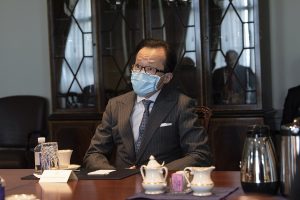On April 2 the heads of the National Security Council for Japan, South Korea, and the United States held trilateral talks in Maryland to review U.S. policy on North Korea. The meeting came a little over a week after North Korea test-launched two ballistic missiles into the Sea of Japan.
U.S. National Security Advisor Jake Sullivan, Japanese National Security Secretariat Secretary General Kitamura Shigeru, and South Korean Director of National Security Suh Hoon agreed on the need to fully implement the U.N. Security Council’s resolutions on North Korea. Sullivan emphasized that resuming dialogue between North and South Korea would be beneficial to the denuclearization of North Korea.
In the one-hour meeting, provocation from North Korea featured heavily. The Biden administration is finalizing its North Korea policy options after consulting with experts and close allies Japan and South Korea.
Last month U.S. President Joe Biden highlighted the possibility of opening the door to diplomacy with North Korea but warned that the United States would respond if the escalations continue. The Biden administration is likely to ramp up pressure against North Korea to abandon nuclear weapons after negotiations with Pyongyang broke down under the Trump administration.
It’s the first time high-ranking security officials from Japan, South Korea, and the United States have met face to face under the Biden administration, highlighting the newfound priority placed on Asian alliances and stability on the Korean Peninsula.
The three security officials also shared concerns over maintaining a free and open Indo-Pacific amid China’s marine expansion in the South and East China Seas. A joint statement issued by the White House avoided naming China outright but stated that all parties discussed “common concerns, including Indo-Pacific security” and “will work together to protect and advance shared security goals.” They also exchanged opinions on the global COVID-19 pandemic, climate change, and the coup in Myanmar, and reaffirmed their commitment to solving the abductions of Japanese nationals by North Korea.
Japan and the United States also held a separate meeting to discuss economic security and policies concerning China and the need to urgently expand semiconductor production. The outbreak of COVID-19 last year caused a global shortage of semiconductor materials and brought automotive and electronic manufacturing to a halt. The semiconductor shortfall shows no sign of easing and U.S. automakers have been forced to cut production due to the lack of parts.
According to Boston Consulting Group, the United States’ share of global semiconductor production fell from 37 percent in 1990 to 12 percent in 2020. Nowadays China, South Korea, Taiwan, and Japan have become the leaders in semiconductor manufacturing. In light of the U.S.-China trade war and the sanctions imposed on Chinese telecom firm Huawei, Japan and the United States are concerned about the concentration of production bases in China.
Japan and the United States have begun talks on building decentralized supply chains and have launched a joint working group. Japan’s National Security Agency and Ministry of Economy, Trade, and Industry (METI) will team up with the U.S. National Security Council (NSC) and the U.S. Department of Commerce to review the risks posed by current supply chains. They are working to design a system away from streamlined production in a single country such as Taiwan, which carries high geopolitical risks.
As a key producer of semiconductor raw materials, Japan will share insights on the semiconductor technology and equipment needed to boost local production. Last week Biden proposed a $50 billion subsidy to fund semiconductor manufacturing. In addition, Japan and the United States are also considering launching a joint research base for technological development.
The sensitivity of the U.S. semiconductor supply chain will be discussed on April 12 with chip makers such as Samsung and various automakers.
A chip supply chain deal is expected on April 16 when Japanese Prime Minister Suga Yoshihide flies to Washington for a bilateral summit with Biden. Suga will become the first foreign leader to visit the United States since Biden took office, further showcasing the administration’s emphasis on the Japan-U.S. alliance.
































